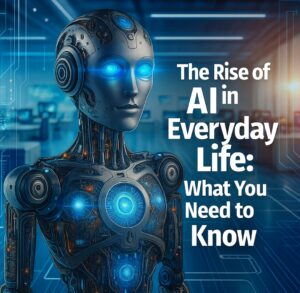The Rise of AI in Everyday Life: What You Need to Know.
Artificial Intelligence (AI) has rapidly moved from science fiction to a deeply embedded force in our daily routines. No longer confined to high-tech labs or cutting-edge corporations, AI now assists us in everything from the way we wake up to how we shop, work, travel, and even protect our homes. This article explores the transformative power of AI, its practical applications, its advantages and potential challenges, and what you need to be aware of as this technology continues its steady rise in everyday life.
What Is Artificial Intelligence?
At its core, AI refers to computer systems capable of performing tasks that typically require human intelligence. This includes understanding language, recognizing patterns, solving problems, and making decisions. Through machine learning algorithms, neural networks, and vast data analysis, AI can learn from past experiences and become even more effective over time.
How AI Is Making Life Easier
1.Personalized Experiences
AI powers recommendations on streaming platforms like Netflix and YouTube, tunes your social media feed, and curates your online shopping suggestions. Leveraging massive data sets, AI identifies your preferences and behaviors, providing a tailored digital experience that feels almost intuitive.
2. Smarter Homes
Home automation has reached impressive new levels thanks to AI integration. Smart thermostats remember your favorite temperature settings while voice assistants (like Alexa, Siri, or Google Assistant) answer questions, play music, or control lighting with simple verbal commands. Many appliances now adjust automatically to your schedule, even placing grocery orders when supplies run low. AI-powered surveillance systems use facial recognition to notify you of unusual activity, adding an extra layer of security to your home.
3. Seamless Communication
AI-driven chatbots and virtual assistants help businesses provide round-the-clock customer service, answer queries instantly, and even process transactions and bookings. In banking, AI chatbots facilitate secure and fast money transfers, balance checks, and spending insights—saving customers time and reducing service costs.
4. Improving Healthcare
Wearable devices, fitness trackers, and health apps use AI algorithms to monitor vital signs, analyze sleep patterns, and offer personalized health recommendations. In hospitals, AI speeds up diagnoses by interpreting scans and medical images, helping doctors make better treatment decisions more quickly. It’s also helping older adults and people with disabilities live more independently with smart reminders and safety monitoring.
5. Navigation and Travel
Navigation platforms like Google Maps and Waze harness AI to provide real-time traffic updates, suggest optimal routes, and predict arrival times. Ride-hailing apps use AI to match drivers and passengers efficiently and calculate dynamic pricing based on demand.
6. Enhancing the Workplace
From drafting emails with AI-powered writing assistants to automating data analysis and scheduling, AI transforms professional environments. It handles repetitive tasks, freeing up humans to focus on strategic thinking and creativity. Advanced AI can even summarize meetings, prioritize workflows, and recommend solutions, making organizations more productive.
7. Smarter Shopping and Retail
Retailers leverage AI to recommend products, manage inventory in real time, and even enable cashier-less checkouts in stores. Smart mirrors in fitting rooms, personalized discounts, and chat-based support are just a few innovations that improve the shopping experience.
 The Rise of AI in Everyday Life: What You Need to Know.
The Rise of AI in Everyday Life: What You Need to Know.The Benefits of AI in Everyday Life
Efficiency: Automates tedious tasks, letting humans focus on higher-level problem-solving.
Personalization: Customizes content recommendations, marketing offers, and even news feeds.
Accuracy: Reduces errors in everything from language translation to medical diagnostics.
Convenience: Centralizes control of home devices, schedules, and entertainment.
Safety: Monitors homes, detects fraud in financial transactions, and alerts users of potential health issues.
The Challenges and Concerns of Everyday AI
1. Data Privacy
AI often requires vast amounts of personal data, raising questions around how that information is stored, used, and protected. Users need to be aware of privacy settings and data sharing policies for the AI-driven services and devices they use.
2. Job Displacement
Automation threatens to replace certain repetitive jobs, particularly in sectors like manufacturing, transportation, and retail. The positive side is that AI also creates new roles focused on maintaining, programming, and improving these systems—but retraining and adaptation are necessary.
3. Bias and Fairness
AI systems are only as good as the data they’re trained on. If the data includes harmful biases, the AI can inadvertently perpetuate them—affecting everything from hiring decisions to loan approvals. Efforts are ongoing to create more ethical and transparent AI models.
4. Ethical Considerations
AI’s increasing presence raises questions about autonomy and responsibility—who is accountable when an AI system makes a mistake? As AI grows more sophisticated, society must navigate these ethical frontiers cautiously.
How to Prepare for an AI-Powered World
Stay Informed: Read up on AI trends, new products, and best practices. Awareness is key to benefiting from its advantages while minimizing risks.
Cultivate Digital Literacy: Knowing how to operate smart devices and use AI-powered platforms will be a core skill. For professionals, learning basic coding or data analysis may offer a significant edge in the job market.
Protect Your Data: Regularly review privacy settings and give permissions only to reputable apps and services.
Advocate for Responsible AI: Support policies, companies, and movements that promote fairness, transparency, and accountability in AI development and use.
